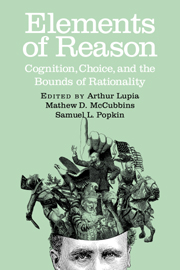Book contents
- Frontmatter
- Contents
- List of Tables and Figures
- Acknowledgments
- List of Contributors
- Beyond Rationality: Reason and the Study of Politics
- PART I EXTERNAL ELEMENTS OF REASON
- 2 Shared Mental Models: Ideologies and Institutions
- 3 The Institutional Foundations of Political Competence: How Citizens Learn What They Need to Know
- 4 Taking Sides: A Fixed Choice Theory of Political Reasoning
- 5 How People Reason about Ethics
- 6 Who Says What? Source Credibility as a Mediator of Campaign Advertising
- 7 Affect as Information: The Role of Public Mood in Political Reasoning
- PART II INTERNAL ELEMENTS OF REASON
- References
- Author Index
- Subject Index
7 - Affect as Information: The Role of Public Mood in Political Reasoning
Published online by Cambridge University Press: 05 June 2012
- Frontmatter
- Contents
- List of Tables and Figures
- Acknowledgments
- List of Contributors
- Beyond Rationality: Reason and the Study of Politics
- PART I EXTERNAL ELEMENTS OF REASON
- 2 Shared Mental Models: Ideologies and Institutions
- 3 The Institutional Foundations of Political Competence: How Citizens Learn What They Need to Know
- 4 Taking Sides: A Fixed Choice Theory of Political Reasoning
- 5 How People Reason about Ethics
- 6 Who Says What? Source Credibility as a Mediator of Campaign Advertising
- 7 Affect as Information: The Role of Public Mood in Political Reasoning
- PART II INTERNAL ELEMENTS OF REASON
- References
- Author Index
- Subject Index
Summary
Levels of political information are notoriously low in the American mass public. How is it that people arrive at political judgments in the absence of detailed information? In recent years, students of American public opinion have latched onto the notion of “heuristics,” or simplifying rules of thumb, to explain how it is that people get by (Sniderman, Brody, and Tetlock 1991). These forms of “low-information rationality” (Popkin 1991) are thought to cut information-processing costs and lead some people to make the same sorts of judgments that they would have made had they been better informed. Lupia's (1994) study of voting on California ballot issues, for example, shows how less-well-informed voters can emulate the behavior of well-informed voters by relying on the cues provided by interest groups and political leadership.
In this chapter, I will argue that affective (i.e., emotional) experiences affect political reasoning and facilitate low-information rationality. In everyday discourse, “being emotional” is seen as dysfunctional, often resulting in decisions or actions that are later regretted. However, I wish to make the case that certain kinds of affective experiences can be useful, rather than dangerous, because they help inform the individual about the state of his or her world. This affective information can substitute for more cognitively expensive forms of information and can aid people in their attempts to form political opinions.
It is not a new idea to political science that affective reactions may indeed be functional (see Marcus and MacKuen 1993; Sniderman, Brody, and Tetlock 1991).
- Type
- Chapter
- Information
- Elements of ReasonCognition, Choice, and the Bounds of Rationality, pp. 130 - 150Publisher: Cambridge University PressPrint publication year: 2000
- 39
- Cited by



